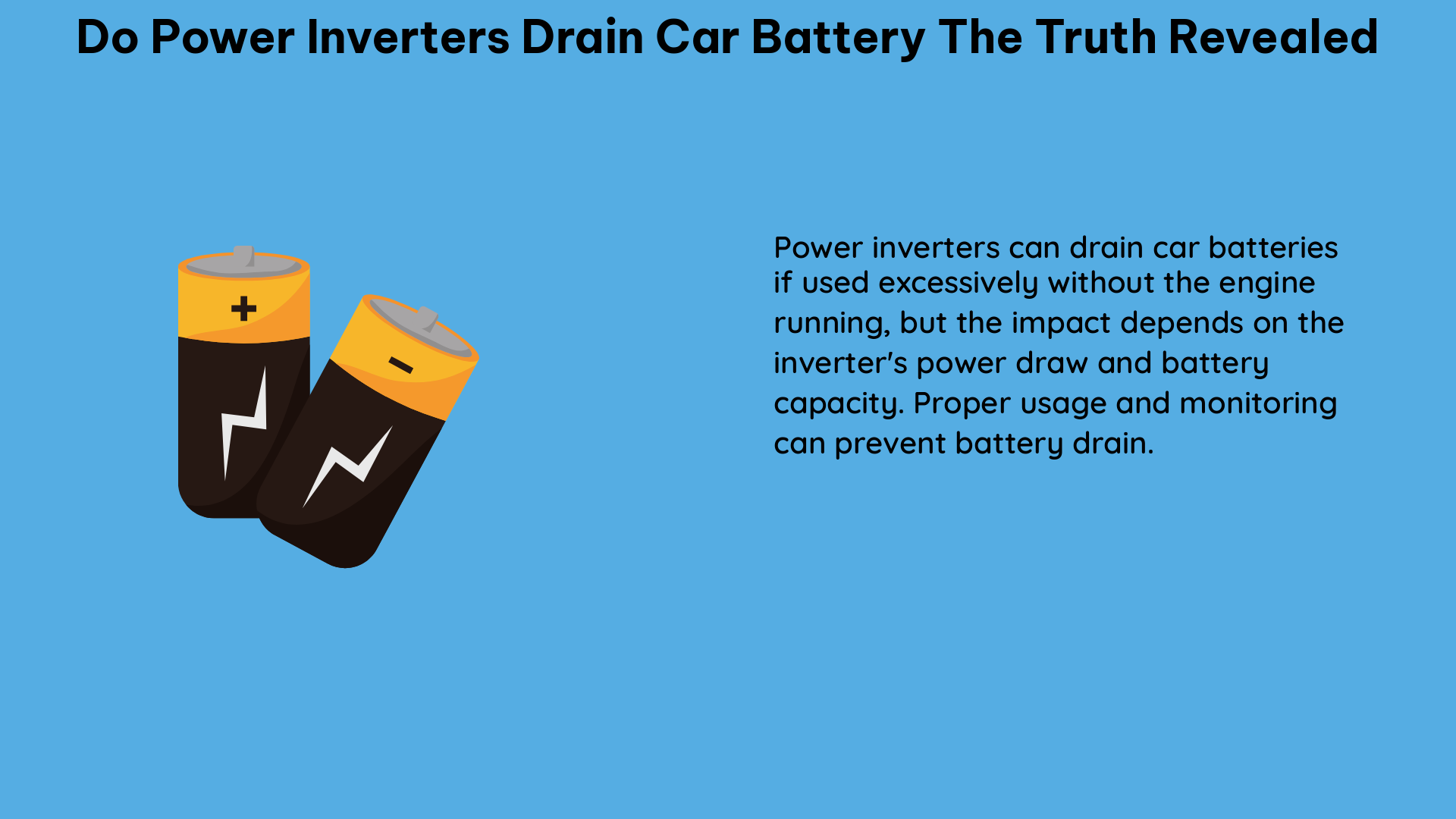Power inverters can indeed drain a car battery, especially when used improperly or for extended periods. The rate at which the battery drains depends on several factors, including the inverter’s efficiency, the power consumption of the devices connected to the inverter, and the battery’s capacity and age.
Understanding the Impact of Power Inverters on Car Batteries
When the engine is off, the battery supplies power to the inverter, which can eventually drain the battery if it’s not recharged. This is because the inverter converts the car’s 12V DC power to 120V AC power, which is used to power various devices and appliances.
The efficiency of the inverter plays a crucial role in determining the impact on the battery. Inverters with lower efficiency ratings tend to consume more power, leading to faster battery drainage. Conversely, inverters with higher efficiency ratings, typically 90% or above, can help reduce power consumption and minimize the impact on the battery.
Factors Affecting Battery Drainage

-
Inverter Efficiency: Choosing an inverter with an efficiency of 90% or higher can help reduce power consumption and minimize the impact on the battery. For example, a 1000W inverter with 90% efficiency will consume around 1111W from the battery, while a 1000W inverter with 85% efficiency will consume around 1176W, resulting in a faster battery drainage.
-
Battery Capacity: The battery’s capacity plays a significant role in determining how long it can power the inverter. A larger battery capacity, such as a deep-cycle marine battery with a capacity of 100Ah or more, can provide more power for a longer period before needing recharging, compared to a standard car battery with a capacity of around 50Ah.
-
Battery Age: As batteries age, their capacity and performance may decline, making them more susceptible to drainage from inverters. Older batteries may not be able to hold a charge as well as newer batteries, leading to faster drainage when powering an inverter.
-
Device Power Consumption: The power consumption of the devices connected to the inverter can also impact the battery’s drainage rate. Using high-power appliances, such as power tools or large televisions, can accelerate battery drainage, while lower-power devices like laptops or small electronics may have a less significant impact.
Preventing Battery Drainage
To prevent the inverter from draining the car’s battery, it’s recommended to follow these tips:
-
Monitor Battery Voltage: Regularly monitoring the battery voltage can help prevent over-discharging and extend the battery’s lifespan. A voltage drop below 12.4V indicates that the battery is becoming depleted and may need recharging. Using a voltmeter that plugs into the cigarette lighter or power port can help monitor the battery voltage.
-
Use a Separate Battery: Connecting the inverter to a separate deep-cycle battery specifically designed for the inverter can help prevent draining the car’s main battery. This dedicated battery can be charged while the engine is running and used to power the inverter when the engine is off.
-
Choose an Efficient Inverter: Selecting an inverter with a high efficiency rating, such as 90% or above, can help reduce power consumption and minimize the impact on the battery. This can be particularly important when using the inverter for extended periods or with high-power devices.
Conclusion
While power inverters can drain a car battery, taking proper precautions and using the inverter responsibly can help minimize the impact and ensure the battery’s longevity. By understanding the factors that affect battery drainage, choosing an efficient inverter, and monitoring the battery voltage, you can enjoy the convenience of a power inverter without compromising the health of your car’s battery.
References:
- Will a power inverter drain my car battery?
- Will an Inverter Drain My Battery?
- Is Car Power Inverter Harmful to Car Battery?

The lambdageeks.com Core SME Team is a group of experienced subject matter experts from diverse scientific and technical fields including Physics, Chemistry, Technology,Electronics & Electrical Engineering, Automotive, Mechanical Engineering. Our team collaborates to create high-quality, well-researched articles on a wide range of science and technology topics for the lambdageeks.com website.
All Our Senior SME are having more than 7 Years of experience in the respective fields . They are either Working Industry Professionals or assocaited With different Universities. Refer Our Authors Page to get to know About our Core SMEs.